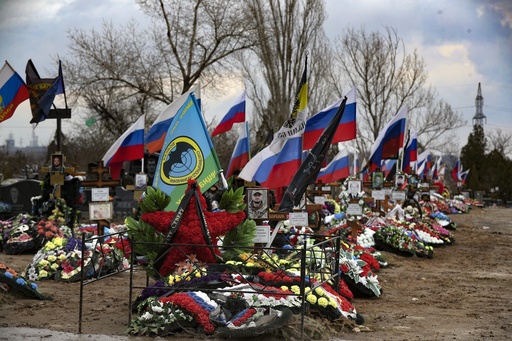Nearly three years after the onset of the conflict instigated by President Vladimir Putin’s invasion of Ukraine, Russian forces are reportedly making steady advances on the battlefield. In contrast, Kyiv is facing significant shortages in manpower and military resources. Furthermore, a potential shift in U.S. leadership could lead to a cessation of extensive military aid to Ukraine, raising concerns in the Ukrainian government regarding their future support.
As Vladimir Putin inches closer to realizing his goals in Ukraine, the prevailing sentiment among experts from both Russia and the West is that he has little motivation to engage in negotiations. Efforts by the U.S. president to coax or warn Putin seem unproductive at this stage. The communication between the two leaders includes flattery and veiled threats, with Putin recently referring to Donald Trump as “clever and pragmatic,” while also reiterating Trump’s baseless allegations regarding the 2020 election outcome. Trump, eager to make his mark as a peacemaker, has complimented Putin and threatened Russia with tariffs and cuts to oil prices, gestures that the Kremlin appears to dismiss.
During his campaign, Trump claimed he could resolve the war in a mere 24 hours, later extending that timeline to six months. He suggested that the U.S. is in serious discussions with Russia concerning Ukraine, often without involving the Ukrainian government in the conversation. Trump believes that he and Putin could soon take significant steps to conclude the conflict, all while Russian forces continue to suffer extensive losses and the economy deals with strict Western sanctions, inflation, and labor shortages.
Nevertheless, Putin’s grip on power remains intact, particularly due to his severe suppression of dissent, leaving him no urgent domestic necessity to seek an end to the hostilities. Fyodor Lukyanov, who has engaged with Putin in forums, pointed out the misapprehension in the West regarding Putin’s desire for a swift resolution, clarifying that this is far from his priority.
The topic of negotiations about Ukraine has raised alarms for President Volodymyr Zelenskyy, who perceives Putin’s intent to engage directly with Trump to the exclusion of Kyiv’s involvement. This stance contradicts the Biden administration’s principle of “Nothing about Ukraine without Ukraine,” which Zelenskyy passionately supports. He emphasized that allowing external parties to make decisions for Ukraine would imply a dangerous precedence that could embolden authoritarian regimes globally.
Putin seems to anticipate that Trump’s leadership might weaken European unity on the conflict. He likened the leaders of Europe to subservient allies of Trump, predicting they would soon conform obediently to his direction. While Trump promotes his negotiation skills, the reality remains that he may find it difficult to wrest from Putin any concessions regarding what Russia considers its historically significant territories within Ukraine, especially if such a deal undermines Western alliances.
Despite Trump’s ambition to establish a strong legacy of peacemaking, critics caution that he would be remembered unfavorably if he allows major concessions to Russia. Former British ambassador Sir Kim Darroch and NATO spokesperson Oana Lungescu have noted that such an outcome would signal a troubling image of American weakness on the world stage.
The last notable encounter between Trump and Putin occurred in 2018 in Helsinki, where there was a semblance of mutual respect. However, former Finnish president Sauli Niinistö remarked on the differences in their approaches—Putin being methodical and Trump making swift decisions. This disparity could lead to friction, as Trump might seek quick resolutions while Putin’s strategy leans toward longer, more calculated moves that bolster Russia’s military standing and weaken Ukraine’s resistance.
Zelenskyy expressed skepticism regarding Putin’s willingness to negotiate, believing that Putin would sabotage any talks, given the obstacles he has raised thus far. Observers note that historical precedents from past Trump-Putin meetings suggest minimal gains, with Trump previously siding with Putin over his intelligence community during their Helsinki meeting, and failing to secure agreements on North Korea’s nuclear ambitions in Singapore.
Last year, the Kremlin proposed a framework for peace based on agreements made in Istanbul earlier in the war, which sought to enforce Ukraine’s neutrality and forbid NATO membership. Moscow has shown resistance to proposals regarding troop withdrawals or reparations for the war. Putin’s vague offers to negotiate, signaling a preference for terms that favor Russian control, have not changed.
Analysis from Russian experts indicates that Putin views negotiations as a means to achieve his objectives rather than a genuine interest in compromise. Any prospective meeting with Trump would likely serve to elevate Russia’s standing internationally while yielding little concession from Moscow.
Trump himself has suggested that the conflict could have been averted had Ukraine negotiated with Putin earlier. He has threatened to impose additional sanctions and tariffs, yet experts believe there are no economic tools strong enough to effectively resolve the war. Many within the Kremlin express indifference to these threats, likely because they consider the current sanctions adequate.
Trump’s inability to guarantee that Ukraine would not join NATO, lift all sanctions unilaterally, or compel Europe to resume energy imports from Russia exposes the constraints of his influence. In parallel, he has proposed leveraging OPEC+ to reduce oil prices as a strategy to dissuade Putin, but the Kremlin argues that the conflict centers on security rather than oil prices.
Strategists suggest that Trump may need to align U.S. oil policy with economic maneuvers against Russia, potentially coupling trade concessions with expectations for reduced ties between China and Russia. Moreover, Europe could strengthen its commitment to Ukraine by procuring American military equipment, substantiating support for Kyiv while also appeasing Trump.
In conclusion, the critical question remains whether Trump can maneuver effectively within the constraints imposed by Putin, who has shown unwavering persistence in his goals within Ukraine.




